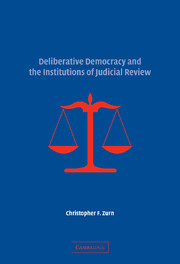Book contents
- Frontmatter
- Contents
- Acknowledgments
- 1 Introduction
- 2 Majoritarian Democracy and Minoritarian Constitutionalism
- 3 From Majoritarian to Deliberative Theories of Constitutional Democracy
- 4 Deliberative Democracy and Substantive Constitutionalism
- 5 Disagreement and the Constitution of Democracy
- 6 The Seducements of Juristic Discourse as Democratic Deliberation
- 7 Constitutionalism as the Procedural Structuring of Deliberative Democracy
- 8 The Institutions of Constitutional Review I: Design Problems and Judicial Review
- 9 The Institutions of Constitutional Review II: Horizontal Dispersal and Vertical Empowerment
- Bibliography
- Index
- Table of Cases
4 - Deliberative Democracy and Substantive Constitutionalism
Published online by Cambridge University Press: 18 July 2009
- Frontmatter
- Contents
- Acknowledgments
- 1 Introduction
- 2 Majoritarian Democracy and Minoritarian Constitutionalism
- 3 From Majoritarian to Deliberative Theories of Constitutional Democracy
- 4 Deliberative Democracy and Substantive Constitutionalism
- 5 Disagreement and the Constitution of Democracy
- 6 The Seducements of Juristic Discourse as Democratic Deliberation
- 7 Constitutionalism as the Procedural Structuring of Deliberative Democracy
- 8 The Institutions of Constitutional Review I: Design Problems and Judicial Review
- 9 The Institutions of Constitutional Review II: Horizontal Dispersal and Vertical Empowerment
- Bibliography
- Index
- Table of Cases
Summary
The procedural justifications for judicial review examined in Chapter 2 are attractive precisely because they do not rely on the superior insight of judges into matters of moral principle or truth. They are thus not subject to the skepticism concerning judicial moral competence which, combined with an insistence on the democratic principle of popular sovereignty, led to worries about judicial paternalism in the first place. However, without some fuller account of democratic legitimacy, both Dahl's inattention to private autonomy rights and Ely's reliance on antitrust-style procedural legitimacy lead to liberal concerns about the security of nonpolitical, individual civil and social rights. In addition, Ely's purely Lockean account of democratic processes in terms of prepolitical preference aggregation and Dahl's more sophisticated account of majoritarian aggregation through pluralistic interest-group bargaining both ignore the intersubjective deliberation about ends and responsiveness to public reasons that are ideally – and often actually – an effective part of democratic self-rule. In other words, from the perspective of deliberative democracy sketched in Chapter 3, the bare or pure procedural accounts of judicial review examined in Chapter 2 rely on insufficiently differentiated accounts of both democratic legitimacy and democratic processes.
This chapter turns to two theories of judicial review that promise to remedy these lacunae by providing richer accounts of democratic deliberation and of the legitimacy conditions required for morally acceptable political outcomes.
- Type
- Chapter
- Information
- Deliberative Democracy and the Institutions of Judicial Review , pp. 106 - 129Publisher: Cambridge University PressPrint publication year: 2007



